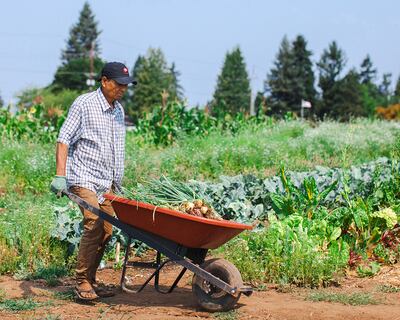This story is published in cooperation with Willamette Week and Oregon Food Bank.
When people think of Oregon Food Bank, they conjure up images of food pantries, meal sites, and volunteers helping others in need. But, while emergency food assistance is a key component of battling hunger, Oregon Food Bank knows there’s more that goes into ending the root causes of hunger.
“We know that we cannot end hunger by simply providing emergency food assistance,” said Susannah Morgan, president of Oregon Food Bank. “To truly end hunger, we need to dismantle the root causes continuing food insecurity, issues like racism, classism, sexism, and more that create and perpetuate the conditions that sustain hunger and poverty.”
To end hunger, Oregon Food Bank focuses on food justice. Food justice, to put it simply, is viewing food as a basic human right. The idea emphasizes communities having power over their food systems, allowing them to decide what to grow, produce, distribute, and consume based on their needs. The purpose of food justice is to eliminate the structures that perpetuate limited food access and disparities in nourishment, while also preserving traditional food systems, land stewardship and cultural practices.
Oregon Food Bank keeps food justice in the fore of everything it does.
“We center food justice in our mission not only through our bodies of work, but also by intentionally supporting and developing Oregon Food Bank staff,” Morgan said

The nonprofit uses a food justice framework to center communities that disproportionately experience hunger, including Black, Indigenous and all People of Color, immigrants and refugees, gender expansive individuals, and single mothers and caregivers. Oregon Food Bank also strives to end the unfair systems that create unequal access to food through organizing, advocacy, and programming.
A key component of the nonprofit’s mission is connecting food justice with social justice, as the issues are intertwined with one another, and overlap in ending hunger. Some examples of different social issues that are connected to Oregon Food Bank’s work toward achieving food justice are: dismantling systemic racism, ensuring affordable housing and health care, transforming criminal justice responses, and working toward inclusive democracy. For example, lack of affordable housing can force individuals to choose between paying for a place to live and buying enough food to eat.
“When our community’s access to nourishing food is taken away, it intersects with other barriers we face, such as housing insecurity, access to healthcare, mass incarceration fueled by systemic racism, and more,” Morgan said.
As Oregon Food Bank continues pursuing its mission of eliminating hunger, food justice will continue to play a pivotal role in accomplishing this goal. The nonprofit’s efforts will find it part of a nationwide push to mobilize communities to help end hunger for good.
“We are committed to addressing the root causes of hunger and building a movement in partnership with those who have experienced and are impacted by food insecurity,” Morgan said. “We will grow alongside our community to build just and equitable communities that never know hunger, because food is a human right.”
Throughout Hunger Action Month, Oregon Food Bank will continue to focus on key resources or actions that we can all take to help end hunger in Oregon.
Join Oregon Food Bank in taking action to end hunger! Visit OregonFoodBank.org/HungerActionMonth to learn more about how you can help.
